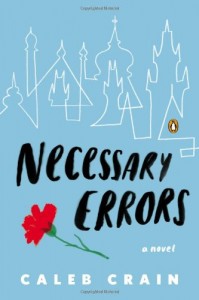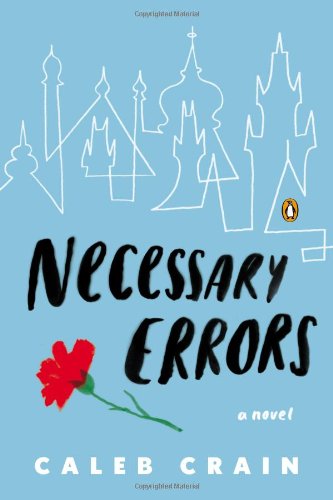 Necessary Errors
Necessary Errors
by Caleb Crain
Penguin. 472 pages, $16.
THIS EXTENSIVE, detailed first novel follows a young American who’s spending a year in Czechoslovakia during 1990, the year after the fall of Communism in that country. Jacob Putnam is an unusual expatriate: gay but not fully out, he spends his days teaching English and his nights slowly, awkwardly getting to know the gay scene in Prague as well as having some romantic relationships. An aspiring writer, he only writes one story during his time abroad, about a friend who has committed suicide. The novel is mostly an interior monologue, capturing Jacob’s reflections as he navigates a country that’s slowly discovering freedom as he discovers his own sexuality and passions.
He quickly finds other expatriates, who form the main social group that he spends his time with. He also meets some native Czechs, including a group of rent boys, one of whom asks him to transcribe the lyrics to a Depeche Mode cassette. Jacob and his friends spend much of the novel sitting in bars around Prague and talking over beers and dumplings. They buy each other rounds and borrow cigarettes from each other. Very little action takes place, and much of the story concerns the developing romances and intrigues among the group. Even without a lot of plot twists, Crain keeps the pages turning. He has a keen eye for detail, such as when he describes the way blood rushes to a woman’s face.
As he builds a life in Prague, Jacob slowly gains an understanding of himself, mainly through trial and error. Just as he feels false when he talks about himself as a writer, he feels equally unsure of himself when it comes to relationships with men. He doesn’t see himself in the behaviors and values typically ascribed to gay men and must reconcile his own values and ambitions with his expectations. He wrestles with concepts learned in America about how muscles work as sexual currency.
One night, Jacob and his fellow expatriates attend a mostly Czech party at a monument to Stalin, and he senses that somewhere in the crowd is “someone who was gay but for whom gayness wasn’t the beginning and end of himself,” someone who understood “himself mostly just as someone attracted to people who were playful, inventive, and gentle.” After this insight, he re-encounters a handsome, talented Czech boy with whom he spends the rest of the novel in a deep, loving relationship.
Necessary Errors is a slow, careful look at the process of coming of age and forming an identity. Although Jacob spends the book thinking about his “project” in Prague, his real purpose there never becomes explicit. Only later does he finally realize why he was there: “It was a feeling about the world: an answering quality.” The novel provides no easy answers about this feeling but hints that it comes from asking one’s own questions—questions that can be difficult to ask when one is home, surrounded by friends, family, and expectations. The book captures this process with insight and acknowledges the difficulties involved in self-directed transformation.
________________________________________________________
Charles Green is a writer based in Annapolis, Maryland.






